Why is it that I can't have a terabyte of RAM on my machine? With a 64bit chip I can virtually access all the memory address I'll ever need yet there is no way of attaching my extra memory to the motherboard.
A 32bit chip can support a total of 2^32 bytes or 4GB or RAM. A 64bit chip can theoretically support 2^64 bytes or 16 million terabytes!!!
As the world moves away from the traditional PC, one where it is normal to open your tower at least once a week to customize something, there is less talk about the components that makes your computer a computer. All talks about RAM is solely limited to data centers or the amount soldered onto your next smartphone.
Just like a camera's MegaPixels we have no idea what to do with the amount of RAM. All we know is that bigger is better which we are gently reminded in the specs graph.

I own a PC that has 4GB of RAM and I know exactly how much I can do with it. When I push it over its limit, I can see it slowing down when it starts to use the paging file (on the hard drive) as extra memory.
The typical hard drive is more than 100,000 time slower than RAM. When your computer is using up all the memory, your immediate option is to close all other applications to free up some so it doesn't have to use the hard drive. However if running out of memory is the result of an everyday task, like video editing, then it is time to add more RAM.
This is the option I went with. My motherboard only has 3 slots of memory and I can each can support 8GB or ram. The total I can get is merely 24GB. Which may sound amazing but, compare it to a terabyte and it feels like my old machine from the old days.
In 1998 I had a computer with a 32MB of RAM and upgrading meant getting two brand new sticks with 64MB each for a maximum of 128MB. it was impossible to think I'd need anything beyond that. My hard drive had 2GB of storage. In comparison, my hard drive was 16 times bigger.
It is reported that Bill Gates, in a talk, said that a consumer will never need beyond 512 KB of RAM yet here I was trying to figure out how I can cram in more RAM to play video games that required at least 64MB.
Today when it comes to hard drives we have more space than we know what to do with. I just bought a set of terabyte external hard drives because they are so cheap. If it's not enough I can buy some more and plug them all in just for fun.
But I don't have this luxury with RAM. The motherboard I found that supports the highest amount of RAM is 96GB. I'll need a considerable upgrade to get that on my machine at home. And if I wanted more, it is physically impossible.

There is no commercial motherboard that can handle a Terabyte of RAM. The problem is not that we can't build it. Sure we can, all we need is 32 slots on a motherboard and we are set. 32 because the largest single RAM stick I can find in the market today is 32GB.
Just like Bill Gate couldn't possibly imagine what one will do with more than 512KB of RAM, it feels the same way with a terabyte. But I would gladly be the guinea pig to test that much RAM.
A terabyte of RAM means rethinking the fundamental of everything we do on the computer. The concept of restarting your computer after an update will be a thing of the past. The memory will be big enough to swap operating system on the fly. You might run two or three OSes at the same time on the same screen.
Having that much memory, means that we will treat it like hard disk space, in other words, we will stop worrying about it.
If we can't have this much memory in a single machine today it's because we shifted our attention from improving our PCs to focusing on mobile devices that are low powered and have a 1 to 2 year lifetime anyway. We don't need as much RAM on the phone not because it couldn't benefit from it but because we have no control over it. If you want more RAM you have to by a whole new device and you can't tell the difference between a 2GB or 3GB device anyway.
More RAM doesn't mean instantly making your computer faster. It means keeping more stuff in memory for faster access. If I load a large video on my program, it might take some time to load it from hard drive to RAM, but once it's there, it never has to come out.
Imagine playing a game where you never see the Loading icon because everything is already loaded in memory.
These are very small trivial example, but I can imagine a world where more memory is the difference between saying “I can't do that, it takes a months to process that much data”, and saying “Give me a couple of minutes”.
Unfortunately, we will not be innovating in adding more Memory in a single computer. Our attention has shifted. For that matter, we are slowly forgetting what memory means and soon we will just call it the 6S or 6S+ version.





Comments
There are no comments added yet.
Let's hear your thoughts